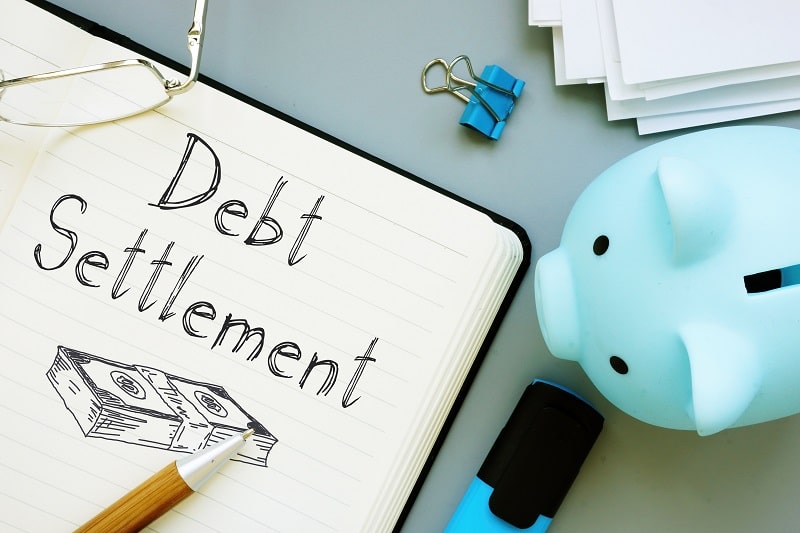There are many ways to become debt-free. But for some debt, paying it off by the snowball method or some other method simply isn’t feasible in a single lifetime. This begs the question: If you find yourself in a financial rut, how do you get out? Debt settlement is one of your options.
At its most basic level, debt settlement involves paying your creditors less than you owe in order to clean your slate and start fresh. But like any debt-relief plan, it’s not a get-out-of-jail-free card. Debt settlement carries serious drawbacks and long-term consequences if you aren’t careful, and it is not the best option for every debtor.
Read on to learn more about this option, its potential benefits, and possible downfalls you should consider.
How debt settlement works
Debt settlement involves working with a creditor, either on your own or through a debt relief company, to negotiate down the total amount you owe. If your creditor agrees to knock off a certain amount of your debt, you will pay the rest as a lump sum and your creditor will forgive the rest. While the unpaid amount will show up on your credit report as a debt that has not been satisfied, your creditors will generally not be able to sue you for the amount owed.
If you are working with a debt relief company, you will generally be instructed to stop your payments on your monthly accounts and open an escrow account to hold your monthly payments. Once the debt settlement company believes your account has enough in it to proffer a lump sum payment to your creditor, it will negotiate on your behalf with a creditor to accept a smaller amount.
If you are working on your own without using a debt settlement company, the process will look different. Typically, this will involve you contacting your creditor to negotiate a settlement. You may be able to accomplish this in one call, or it may take several attempts. Once you’ve reached an agreement, however, it is vital to put it into writing in case the creditor wants to challenge it down the road.
Debt settlement benefits and drawbacks
One of the primary benefits of debt settlement is that it reduces your total debt liability so you can pay down your accounts and start fresh. This is especially helpful if your debt is so large that it seems virtually impossible to pay it all down in a reasonable amount of time.
However, it is vital to understand the impact on your credit score, which starts before you even reach an agreement with your creditors. If you are working with a debt settlement company and you are instructed to halt payments on your accounts until an agreement is reached, the credit bureaus will conclude that you are delinquent on your accounts, and your score will take a hit. Your creditor may eventually send your account to collections, which is often the last step before a lawsuit. What’s more, you may also be hit with late fees and other penalties when you stop making payments on your accounts.
Other considerations
Cost
While debt settlement may not carry out-of-pocket costs, some debt settlement companies will charge an administrative fee or deduct a percentage of your settlement.
Tax
Even if your creditors prove to be forgiving, Uncle Sam may not be. You will likely owe taxes on the forgiven amount, because a forgiven debt is deemed taxable income. As such, before you accept a settlement, speak with a qualified tax professional about your potential liabilities.
The state of your accounts
If you’ve already fallen several months behind on your payments, debt settlement may not be the best option for you. Your creditors are much more likely to work with you and offer flexibility if you’ve reached out to them before falling delinquent, not when you’re already struggling.
Communication with your creditors
Bear in mind that your creditors will be more likely to help you if you communicate openly with them BEFORE you default on any payments. This will give you credibility and signal to them that you’re willing to pay them, but you just need some flexibility on due dates or even the total amount owed. If you don’t have a good line of communication, consider hiring a debt relief company to represent you and to communicate with them on your behalf – or consider another debt relief option.
Cash flow
Debt settlement can be a great option for debtors with plenty of revenue and the ability to repay, but who have cash flow issues that keep them from making payments in a timely manner. By adjusting your due dates or extending your repayment schedule, you might be able to address many of your cash flow issues while still paying your creditors.
Working with a debt relief company
If you prefer not to DIY your debt settlement, working with a reputable, accredited debt relief company may be a good option. Make sure you do not settle for the first one you find, and confirm that the company is BBB accredited, licensed in your state, and offers free consultations to potential new customers.
The bottom line
No matter whether you work with a professional or DIY your debt settlement, make sure you know and understand both the benefits and drawbacks so you know whether this is the right option for you.


